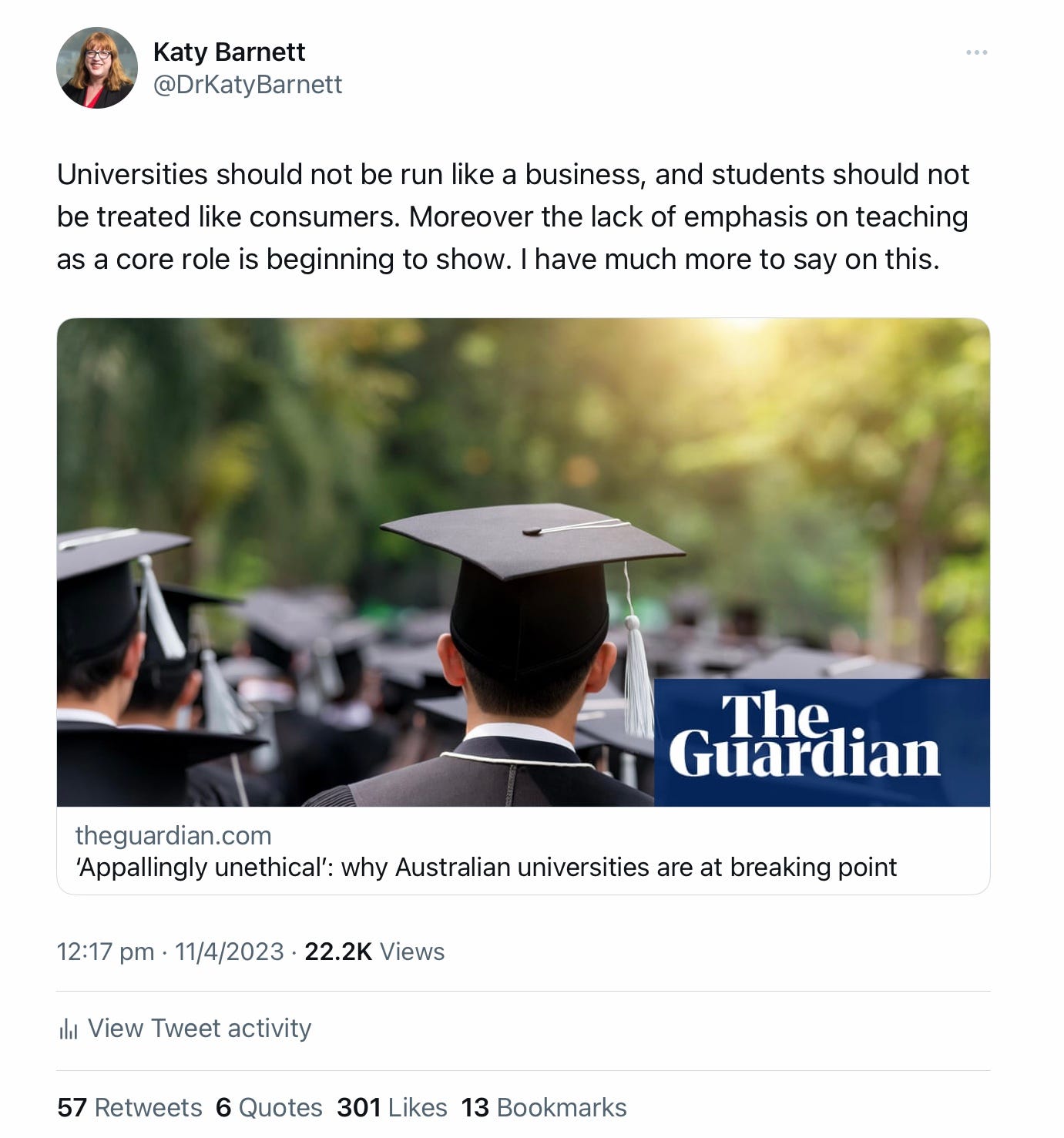Are students consumers?
Teachers provide a service, but the reality is complex
This Substack will remain free—although you’re welcome to take out a paid subscription if you want (and can afford it!).
Alternatively, if you ever want to give a tip, here’s a link by which you can do so (absolutely no obligation! - it’s just that one reader expressed a desire that I give a mechanism to do so).
Recently I had a tweet go viral (well, comparatively viral for me).
It took my back to my first year of teaching, in 2006. A student came to see me, unhappy with his Property Law result (in the low 50s as a percentage).
“I didn’t pay for this result!” he exclaimed, in high dudgeon, disclosing that he was one of the minority of students who paid for the LLB at that time.
Initially I was unbelievably shocked, but I calmly explained to him that he was correct. He had not paid for “that result.” He (or more likely, his parents) had paid for him to be taught the basics of property law. That, I was confident, I had done to the utmost of my ability and with as much expertise and enthusiasm as I could muster. What students did with the knowledge I had imparted to them, how carefully they listened, whether they read the texts as instructed, whether they could apply it to the factual scenario in the exam? That was up to them. I had no control over that.
I recognised the student’s name—he’d also emailed me with questions at 3am on the morning of the 9am Property Law exam—and I strongly suspect he crammed at the last minute. It showed in their result. It was too late in the wee hours of the morning before the exam to be asking those questions. Note to all law students: law is hard. It’s not something where you can readily cram all the knowledge in the morning before (particularly not indefeasibility of Torrens title).

I strongly believe that students should have good teachers, and I am constantly trying to improve my own teaching. However, teaching is not a service like other services.
Let’s say you want your house to be painted forest green. You stipulate what you want. You sit back while the painter paints the house. There’s no effort required on your part.
Teaching is not like that. You can have the best teacher in the world, but if you don’t put in effort, or if you leave things too late, or you don’t do the reading, you may not do well. And that’s no fault of the teacher: part of the result is dependent upon the efforts and abilities of the student.
One aspect of the problem is grading. The student’s complaint was revealing. We had different objectives. My objective was to get him to understand the basics of property law, and for those principles to stay with him. His objective was to get a good grade in property law. If he forgot all the knowledge the day after the exam, I’m not sure he would have cared, as long as he got the grade he wanted.
Sometimes I wish I could abolish grading altogether, because it distracts from learning. If a student says, while I’m teaching, “Is this on the exam?” my heart sinks. Maybe it is, maybe it isn’t. Regardless, I am teaching it to my class because I think it is an aid to a greater depth of understanding. I don’t want people to ignore what I’m saying, just because I won’t test them on it. On the other hand, most students won’t study without incentives, some of which include being tested on what they’re learning.
Admittedly, I’ve never had a very instrumental view of study. I was that student, the one who did the extra reading and went through the question prompts. I didn’t do it because I am a goody-two-shoes: any school teacher who encountered me can tell you that I was a challenging student. I did it because I am curious. My life is a journey in trying to understand. My best friend from law school days says, “You’re the only one who’s surprised that you ended up as a Professor, you know.” (Seriously, there’s a little part of me which really still cannot believe it.)
The student focus on grading arises because the chickens in Goodhart’s law have come home to roost, yet again: “When a measure becomes a target, it ceases to be a good measure.” When we measure student understanding with grades, students become obsessed with the target (a high grade), and forget the fundamental object itself: to gain knowledge and understanding. This means that many students, quite rationally, become instrumental, ignoring knowledge not directly tested. They may also attempt to tell the lecturer what they think the lecturer wants to hear, regardless of whether they actually believe it or not, in order to obtain a high grade.
I make it quite clear to my students in their first class with me: I do not want to hear a particular theoretical account mirroring my own. If I wanted my views repeated back at me, frankly, I’d get a flock of parrots. I understand, however, that this is scary: students have to think for themselves and question. I wonder sometimes if some students like doctrinaire lecturers because it’s easier to know what you have to do. Trot out the routine phrases, say what you have to say, and there’s your high mark.
Relatedly, I’ve noticed with my two older high-school aged children that school assessment has become increasingly quantitative, not qualitative. For some subjects, where there is a right or an wong answer, this is fine. But I’ve seen it even in subjects such as English. School students must structure each essay paragraph according to the TEEL structure: topic, example, explanation, linking sentence. Exams are not assessed on whether students can write fluently, and use a wide vocabulary; they are assessed on whether students fulfil those criteria. Some structure is necessary for a coherent essay, but a structure as rigid and prescriptive as this stymies creativity, and creates a “colour by number” approach to essay writing. I’m not sure that my own writing would pass.
This caused me to recall why I came up with the marking rubrics I now use regularly for exam papers, again in my early years of lecturing. Another student (different to the one mentioned at the outset of this post) sought to challenge his grade. I spent an hour going through the paper with the student. Despite his initial threats, the student did not mount further challenges to his grade, such was the thoroughness of my explanation.
Showing the student exactly why he had not done well had been time-consuming. Hence, I developed a rubric, to show students what I generally expect to see in an answer. Later, it proved very helpful when I was promoted to coordinating subjects, to ensure all markers had the same basic approach when grading. Parity is important. However, I don’t allocate marks to each point. A student can discuss every issue in a pedestrian manner, and get a middling grade, or miss an issue, but write an exceptional and perceptive paper in all other regards, and get a very good grade. My assessment involves a qualitative aspect.
I understand, again, that this might be different in a subject where there is more clearly a correct answer. In law we are constrained by what the legislature and the courts say, but within that, there is room for different interpretations and approaches. That’s why you have High Court cases where all seven justices disagree. The law is not absolutely certain.
Wherefore, you might wonder, all these students challenging their grades? Again, this comes back to the notion of student as consumer. Anyone who has worked in retail knows that the customer is always right. If the grade isn’t good enough, the consumer complains. Sometimes student complaints have validity—once a student very politely inquired about a grade, and I discovered I’d missed part of their answer because there was a blank page in the exam booklet, and it had looked like the answer ended there, whereas the answer had continued on another two pages after the blank page, fully answering the question—but sometimes they do not.
The principal-agent problem means that there is an incentive for administrations not directly involved in teaching to agree with complaining students, to ensure that they are satisfied.
The idea that the customer is always right is at odds with the very point of learning: the student is not always right. Assessing students’ competence requires lecturers to judge where students have made mistakes.
One might think that if universities regard students as consumers, it would improve teaching quality. There are several reasons why this is not the case. For a helpful discussion of the broader issues, this post by Professor Simon Chesterman1 is illuminating: seeing students as either “products” or “consumers” is unhelpful.
Once a student enrols in university, seeking certain credentials, if some of the lecturers are not the best, will it cause ramifications for the university? The student still wants the credential and has committed to the course. Most students will put up with a few dud lecturers, as long as the rest are good. Sorry-not-sorry to bring out the nasty cynic, but the teachers simply have to be on average good enough so that the students keep enrolling. There’s no immediate incentive for the university to change their practices, particularly if most students are happy enough.
Eventually, if enough students have a poor experience, the reputation of the university or the course might suffer, but as Chesterman points out, university ranking systems suffer from the same quantitative problems we’ve discussed above.
Judging the quality of teaching is always difficult, in any case. If students give lecturers positive reviews, it can equally reflect whether the students like the lecturer, or whether the subject is “easy” or “exciting”. Expertise in a subject doesn’t necessarily make one an excellent lecturer, either. I find teaching the topics about which I know the most to be the very hardest to teach - I have to actively recall what it is to know nothing, before I start the class, and reduce my explanations down to their essence.
Students’ results do not reflect the quality of teaching, either, but tend to reflect the both the abilities of individual students, and the effort they put into study. And sometimes, an able student who puts in a good deal of effort and study can have a bad exam. This happened to me in law school a few times. It happens that my result in Trusts, one of the subjects in which I am now an international expert, was my second worst grade in undergraduate law school. The fault was not that of my teachers, who were excellent, but my own fault: I made a wrong turn in an answer. C’est la vie. Obviously I did not let it interfere with my passion for trusts law, which has persisted to this day.

Quality of teaching surveys (where students are asked to give lecturers numerical scores) are notoriously inaccurate, and biased against female lecturers and lecturers from ethnic minorities. Both male and female students judge female lecturers more harshly, all other things being equal.2 In light of this, our own faculty has moved away from relying on them so heavily, and moved into peer review.
Added to this, a large group of academics do not regard teaching as a core part of their role. It is secondary to their role as researchers, a role which has come to the fore with the rise and rise of research grants since the Cold War. While lecturers are engaged in research, they may get PhD students or other causal staff to teach their subjects instead, particularly if they are large compulsory subjects. As I have outlined here, a huge amount of effort is put into grant applications by academics and universities, even though student fees or government funding for students makes up a greater share of financial returns. Promotions have traditionally depended primarily upon an academic’s publication and research record, although in recent years, more effort has been put into recognising teaching (something I’m very glad about).
In conclusion, no, treating students as customers does not improve teaching. Indeed, it may erode the quality of teaching because teaching is an unusual service, and the need to test the knowledge of students is at odds with the customer service mentality.
There is also a potential mismatch between what the students think they are buying (some think they are buying a grade or a qualification) and what lecturers think they are providing (generally, provision of knowledge, understanding and resources, as well as guidance on how to do certain things).
Finally, universities are unsure what their main aim is. Are they primarily for teaching, or are they primarily for production of research? How are these things to be juggled? It will be interesting to see how these questions are resolved in coming years.
I can vouch for Professor Chesterman’s teaching skills: he was my student tutor in Torts in first year.
See eg, Kristina MW Mitchell and Jonathan Martin, ‘Gender Bias in Student Evaluations’ (2018) 51(3) PS: Political Science & Politics 643; Lillian MacNell, Adam Driscoll, and Andrea N Hunt, ‘What’s in a Name: Exposing Gender Bias in Student Ratings of Teaching’ (2015) Journal of Collective Bargaining in the Academy Article 53; Anne Boring, ‘Gender Biases in Student Evaluations of Teaching’ (2017) 145 Journal of Public Economics 27; Lisa Martin, ‘Gender, Teaching Evaluations, and Professional Success in Political Science’ (2016) 49(2) PS: Political Science & Politics 313; Andrew S Rosen, ‘Correlations, Trends, and Potential Biases among Publicly Accessible Web-Based Student Evaluations of Teaching’ (2017) Assessment & Evaluation in Higher Education January 1.



I remember when the Dawkins Reforms came in and overnight faculty at the Standing Committee started talking about 'markets' not students. "This ain't gonna end well", thinks me. A lot of people don't understand that you can't pay for knowledge. A lot of people don't even get that's what you're there to get. Jus' gimme the embossed piece o' paper and a starting salary of hundreds of money!
1. Monetising everything through markets (and instrumentalising including through govts) is pernicious - unfair for those lacking wealth but also undermining essential values - https://scholar.harvard.edu/sandel/publications/what-money-cant-buy-moral-limits-markets
2. Looking forward to your sequel on similar problems re university ranking metrics!